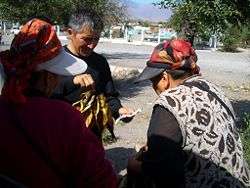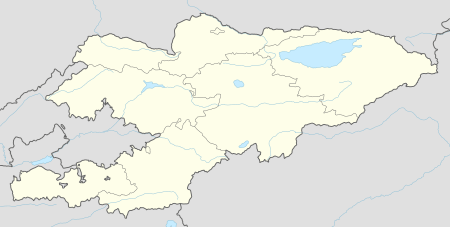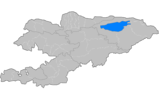Balykchy
Balykchy (Kyrgyz: Балыкчы - Balıkçı) is a town at the western end of Lake Issyk-Kul in Kyrgyzstan, at an elevation of about 1,900 metres. Its area is 38 square kilometres (15 sq mi), and its resident population was 42,875 in 2009 (both including Orto-Tokoy).[1] A major industrial and transport centre (wool and crop processing, lake shipping, rail terminal, and road junction) during the Soviet era, it lost most of its economic base after the collapse of the Soviet Union and the closure of virtually all of its industrial facilities.
Balykchy Балыкчы | |
|---|---|
 Fish vendors at Balykchy selling dried fish to a transit bus passenger | |
 Flag  Coat of arms | |
 Balykchy Location in Kyrgyzstan | |
| Coordinates: 42°28′N 76°11′E | |
| Country | Kyrgyzstan |
| Region | Issyk-Kul Region |
| Area | |
| • Total | 38 km2 (15 sq mi) |
| Population (2009)[1] | |
| • Total | 42,875 |
| • Density | 1,100/km2 (2,900/sq mi) |
The main road from Bishkek, the capital of Kyrgyzstan, to China, a part of the ancient Great Silk Road, passes through Balykchy before it starts its long and arduous way across the alpine ranges of Naryn Province in central Kyrgyzstan to the Chinese border at Torugart Pass. Plans for the rail road from the Chinese border to Balykchy, where the line from Bishkek currently ends, are under discussion. Two other roads go around the north and south sides of Issyk Kul to Karakol and then around the east end of the Kungey Alatau to the far southeast of Kazakhstan. [2]
History
The history of Balykchy begins with a post station and farm, established by M. I. Bachin, retired soldier of Naryn Fort in Kyzyl Tokoy area in 1884. At the end of the 19th and beginning of the 20th century the settlement was known as Ketmaldy (the nearby river's name), Novodmitrievka (after the family name of the owner of a local stud-farm; E.S.Dmitriev), and Bachino (after M. I. Bachin). It was named Rybachye (fishing place in Russian) from 1909-1993.[3] In the early 1990s, following the disintegration of the Soviet Union, the town was known as Issyk-Kul, taking the name of the adjacent lake. Shortly after independence, its name was changed to Balykchy which means fisherman in the Kyrgyz language (and also in its sister language Turkish).
Demographics
Balykchy is the eighth largest town in Kyrgyzstan with a resident population, according to the Population and Housing Census of 2009, of 42,380 or 42,875 including Orto-Tokoy.
| Year | Pop. |
|---|---|
| 1935 | 2,000 |
| 1939 | 5,400 |
| 1970 | 28,555 |
| 1979 | 33,716 |
| 1989 | 43,265 |
| 1999 | 42,346 |
| 2009 | 42,875 |
| Source:,[1][3] | |
Transport
The small old airport is no longer in operation. The passenger railway station marks the end of the railway line from Bishkek; it has newly begun direct services in 2018 to/from Tashkent, as well as long existing rail services to Kazakhstan.[4] In March 2018, Uzbekistan Railways began a new service, connecting Tashkent with Balykchy.[5]
In popular culture
- In the 2003 video game Command & Conquer: Generals, Chinese forces must dislodge terrorist forces entrenched inside Balykchy, using Chinese weapons and occasional U.S. Air Force bombers.
References
- "2009 population census of the Kyrgyz Republic: Issyk-Kul Region" (PDF). Archived from the original (PDF) on 10 August 2011. Retrieved 2011-08-10.
- Falling Rain Genomics, Inc. "Geographical information on Balykchy, Kyrgyzstan". Retrieved 2008-11-27.
- Иссык-Куль. Нарын:Энциклопедия [Encyclopedia of Issyk-Kul and Naryn Oblasts] (in Russian). Bishkek: Chief Editorial Board of Kyrgyz Soviet Encyclopedia. 1994. p. 512. ISBN 5-89750-009-6.
- https://en.trend.az/casia/kyrgyzstan/2866473.html
- "Uzbekistan Opens New Railway Routes to Kyrgyzstan, Russia". EurasiaNet. March 22, 2018.
A weekly train running the route from the capital of Uzbekistan to Kyrgyzstan’s Issyk-Kul region was set to depart on its maiden trip on the evening of March 22 [...] The train traveling from Tashkent to Balykchy, a town on the western end of Issyk-Kul Lake, will be able to carry up to 300 passengers.

External links
| Wikivoyage has a travel guide for Balykchy. |
![]()
